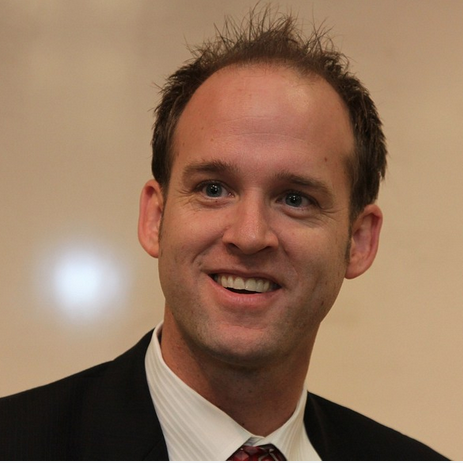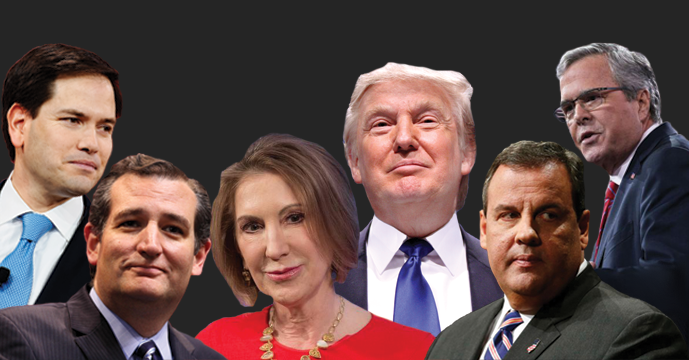Is This Any Way to Choose a President?

Corey Cook
Corey Cook, Professor of Politics is currently on leave but is still a critical observer of local, state and national politics. Professor Cook regularly contributes to the Leo T. McCarthy Center blog while he establishes the School of Public Service at Boise State University.
On the eve of the first in the nation primaries in New Hampshire, the presidential nominating process is beginning to take some shape. On the Republican side, the field has been whittled from more than a dozen candidates (enough to fill two debate stages it seems) to six more (or less) serious contenders. And on the Democratic side, the once invincible frontrunner appears to be locked in a long-term contest. Hopefully a more well-defined campaign will reduce the amount of ill-informed punditry and meaningless media babble. I’m not optimistic, but perhaps it would be helpful to remember that this is a process designed to choose a president, not the winner of Celebrity Apprentice.
For the past month, the national media covering the election has spent countless hours debating “home brew servers”, whether Jeb Bush is misleading voters by putting the exclamation point behind his name on his logo (Jeb!), if Larry David is more or less electable than Bernie Sanders, whether it was OK or not for Dr. Ben Carson to fly back to Florida after the Iowa caucuses, and how Marco Rubio got stuck on repeat during the last debate. And of course covering Donald Trump’s every utterance. And that’s just background noise to the “real story”: the relentless horse race coverage involving “jockeying” candidates, “sprinting” to the finish line, edging out their nearest contender “by a nose”. Taking the horse race analogy to it’s illogical extreme, the media now have Republican candidates running in lanes: the “establishment lane”, “evangelical lane”, “insurgent lane.” Forgetting for a moment how wrong nearly all of the pundit class has been to this point (Trump will crater, Rubio will cruise in New Hampshire, Sanders can’t raise money…) what is astonishing is that given the incredible amount of media attention and constant pontificating, there are a number of underreported stories. Here are a two.

There are several different primary elections happening at the same time. One leading candidate for the nomination Scott Walker of Wisconsin didn’t even survive long enough to enter Iowa. Many more disbanded their efforts within hours of the first caucusing, and several others are expected to end their campaigns after New Hampshire. But these states mathematically do not matter to the outcome. Democrats will have 4,763 delegates choose their nominee at the convention this summer. Only 44 were decided in Iowa with another 24 to be allocated after New Hampshire.
Both are extreme outliers (a fact that clearly distorts not only the political process but also federal policymaking – hello ethanol subsidies). On the Democratic side, both states are among the least diverse of any electorate. New Hampshire is the second most liberal. On the Republican, Iowa is overrepresented by religious conservatives (past winners include Mike Huckabee and Rick Santorum and Pat Robertston narrowly lost against Bob Dole). By most measures, the results in these states do not matter. Instead, it’s the perception of how a candidate did that matters relative to expectations. But this isn’t how voters see things at all. Marco Rubio did not “win” Iowa, he came in third. But to those for whom the horse race analogy is apt – wealthy donors hoping to maximize the returns on their “bets” – momentum and the perception of success is as important as delegate counts. Candidates who are “forced out” after poor showings are those who have difficulty convincing donors of their electability, a perception that makes its own reality.
The overreliance on early state results is an absurdity without understanding the full campaign finance picture. The top 100 donors in the 2016 cycle thus far, have spent $195 million. That is more than the smallest two million donors combined, according to Politico (who have contributed only $155 million). The perception of success or failure is paramount to these top donors – the vast majority of whom are motivated primarily by ideological and policy considerations and are eager to back the most viable acceptable candidate. Rubio’s Iowa win sent a clear signal to these top donors about his relative electability vis-à-vis Jeb Bush, John Kasich, and Chris Christie. After gaining only a small amount of additional (and I would argue highly skewed data) from New Hampshire, you can be assured that betting patterns will change again.
Secondly, because these are intense intraparty squabbles where perhaps the only point of agreement is how much better one’s fellow partisans are than anyone else of the opposing party (thus the constant need to get candidates to pledge to support anyone on stage running against any candidate of the opposing party), we’ve lost focus on whether the person elected will have any ability to get things done.
The fact is that Democratic and Republican debates are different not only in size and tone, they are about substantively different realities. The candidates are talking about entirely different issues in entirely different ways, with diametrically opposed world views. Democrats talk about climate change, income inequality, and banking regulations. Republicans talk about abortion, Isis, Iran, and Obamacare.
It’s understandable that the debate moderators are interested in pointing out those issues that matter most to primary voters. But this focus diverts attention from the remarkable difference between the two different debates we’re having. It’s not just that candidates stake out more ideologically pure positions in the primary only to “pivot” back to the middle in the general election, it’s that they are talking to two entirely different audiences about entirely different things. And this is deeply concerning for democracy and any notion that whoever emerges victorious in November will have any capacity to bridge the partisan divide and actually govern.
Our process is largely determined by the largest donors and candidates appealing to their most strident fellow partisans. And then we wonder why Washington, D.C. is mired in gridlock and compromise is uttered like a dirty word. It would be difficult to argue that the next president will be better positioned to govern after surviving this process – and ultimately that’s a pretty terrible way to choose a president.
Donations help our students attend conferences that deepen their educational experiences and help further their careers.
Applications for our Master of Public Affairs and Master of Arts in Urban Affairs programs close March 1 – apply today!
